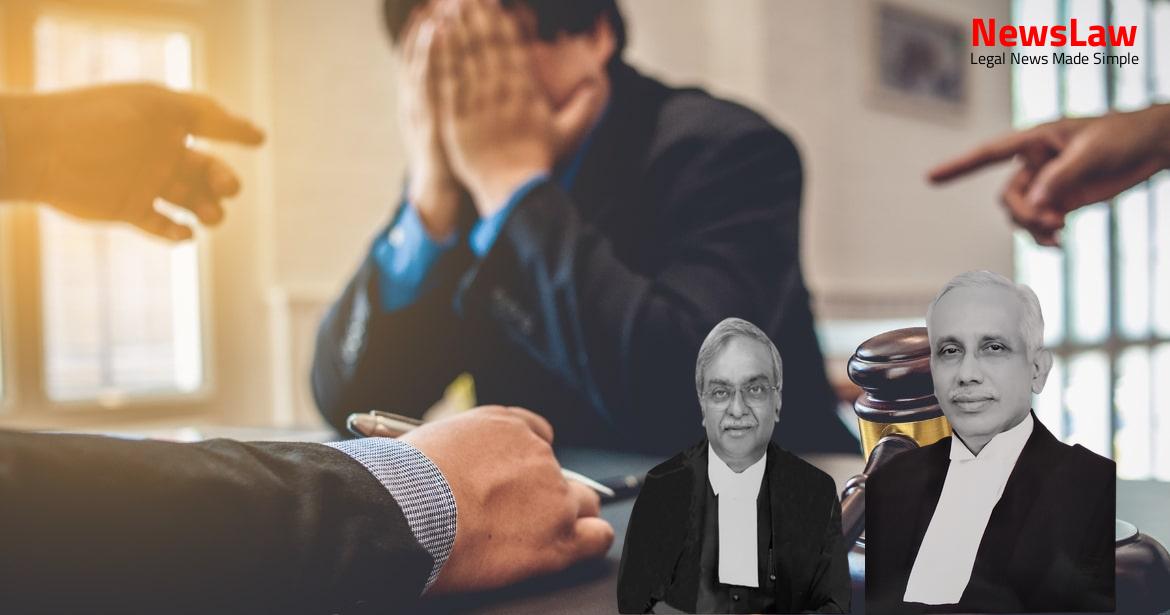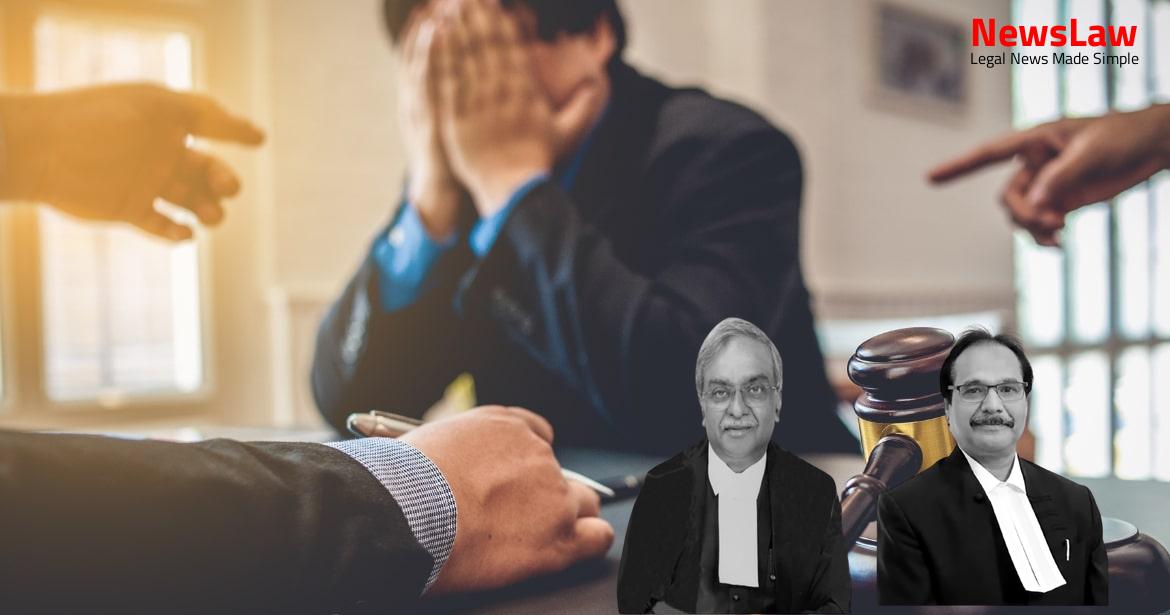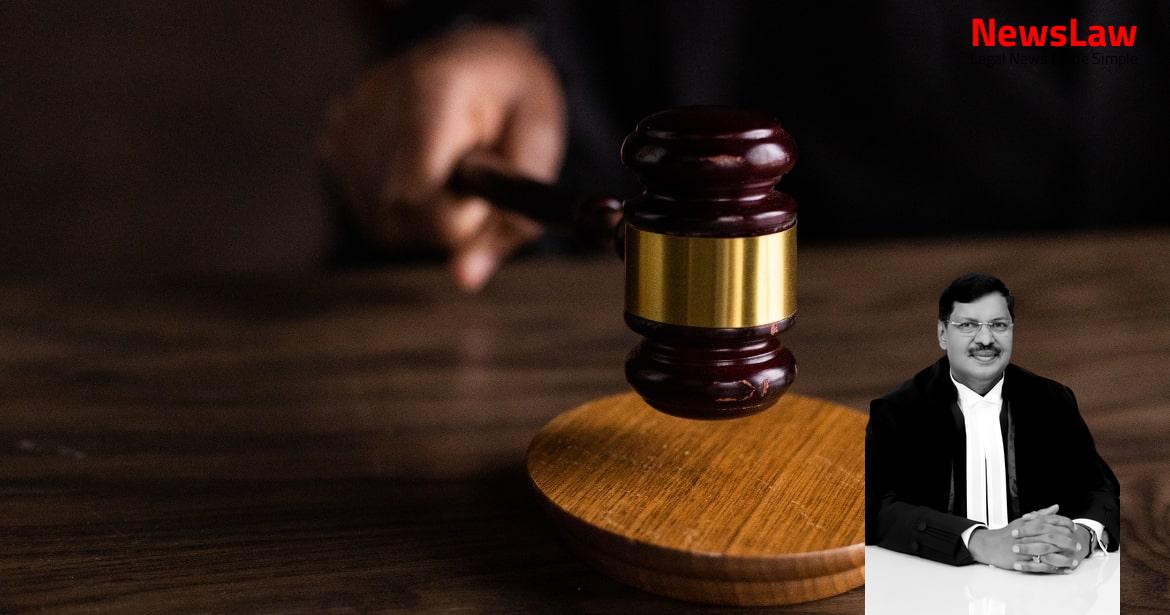Explore a detailed legal analysis of a land dispute case where the Court’s examination of evidence, legal principles, and appellate court duties played a pivotal role. The case underscores the importance of impactful judgments in the appeal process to ensure fair outcomes. Follow along to gain insights into key legal considerations in land disputes.
Facts
- The appellant alleged that she had paid Rs. 12,000 for a property in Dyavasandra Village but the respondent declined to execute the sale deed.
- The Trial Court decreed the appellant’s claim for half share in the property in Schedule ‘A’.
- The respondent contested the suit and denied the appellant’s claim for ½ share in the property.
- The High Court partially allowed the appeal, reducing the appellant’s share to ¼ in the property described in item no. 3 of Schedule ‘A’.
- Evidence including receipts of payment, statements, and cross-examinations were considered by the Trial Court.
- The respondent claimed to be solely cultivating the property and was granted occupancy rights after his father’s death.
- The High Court modified the Trial Court’s decree, reducing the appellant’s share in the property in dispute.
- The property was deemed to be self-acquired of the father, with both children entitled to inherit upon his death.
- High Court upheld the ¼ share of the appellant in the properties described in item nos. 1 and 2 of Schedule ‘A’.
- High Court agreed that the property at item no. 3 of Schedule ‘A’ was jointly cultivated by the defendant and his father.
- Upon the father’s death, defendant would get ½ share of his own and the remaining ½ share of his father would be divided between his heirs.
- High Court confirmed the ¼ share to the appellant for item nos. 1 and 2 of Schedule ‘A’ properties.
- City Civil Judge decreed the suit granting appellant ¼ share in properties of item nos. 1 and 2, and ½ share in item no. 3 of Schedule ‘A’.
- City Civil Judge directed the respondent to execute a sale deed for the property described in Schedule ‘B’ of the plaint.
Also Read: Balancing Private Grievances and Public Interests
Issue
- The only issue left for consideration is the appellant’s entitlement to a ½ share or ¼ share of the property in question.
- Claims regarding ½ share in other properties have been closed at the first appeal stage.
- The Trial Court framed six issues, primarily focusing on the joint family property status, the execution of an agreement, limitation bar, and the entitlement of the plaintiff to the suit relief.
Also Read: Quashing of Criminal Proceedings Based on Insufficient Allegations
Analysis
- High Court did not record any finding on facts or law in the present case.
- The first appeal is a valuable right where all questions of fact and law decided by the Trial Court are open for reconsideration.
- The High Court failed to address the submissions and grounds of appeal, nor did it analyze the evidence based on legal principles and case law.
- Duty of the High Court as the first appellate court was to consider all issues and evidence before deciding on the title of the property.
- Ex.P-5 mentioned that the land was jointly cultivated by the defendant and his father, making it a joint family estate.
- The High Court confirmed the entitlement of the plaintiff to a share in Item No.3 of the property but failed to finalize and close the relief granted to the appellant in the appeal.
- The High Court’s judgment lacked a thorough discussion on facts and law, affecting the appellant’s right to a fair hearing in the appeal.
- Scope, power, and duty of the First Appellate Court in deciding an appeal under Section 96 CPC read with Order XLI Rule 31 CPC.
- Order XLI Rule 31 of the CPC provides for the contents of the judgment of the First Appellate Court.
- Contents of the judgment include points for determination, decision thereon, reasons for the decision, and relief to which the appellant is entitled if the decree is reversed or varied.
- Section 96 and Order XLI Rule 31 of the CPC govern the appeal process from original decrees passed by Courts exercising original jurisdiction.
- An appeal from a decree passed by a court of original jurisdiction must be filed under Section 96 of the Code of Civil Procedure, 1908.
- The judgment of the appellate court must reflect a conscious application of mind and record findings supported by reasons for its decision on all issues raised by the parties.
- Failure to comply with the requirements of Order 41 Rule 31 of the CPC leads to infirmity in the judgment.
- The appellate court has the jurisdiction to reverse or affirm the findings of the Trial Court, and an appeal involves a rehearing on questions of law as well as fact.
- The judgment of the appellate court should be supported by reasons on all issues arising, along with the contentions put forth by the parties.
- When reversing a finding of fact, the appellate court must closely examine the reasoning of the Trial Court and provide its own reasons for arriving at a different conclusion.
- Case involved a suit initiated in 1991
- Evidence discussed by Trial Court was not disputed
- No good reason found to remand the matter to the High Court
- Decision made to set aside High Court judgment and confirm Trial Court’s judgment and decree regarding property share
- High Court’s failure in forming points for determination and considering evidence led to error
- Impugned judgment of High Court deemed unsustainable and set aside
Also Read: Reversal of Acquittal: High Court Convicts Accused in Murder Case
Decision
- The Trial Court will proceed to draw out the proceedings for final decree of partition.
- No costs are to be imposed.
- The appeal has been allowed.
Case Title: SOMAKKA (DEAD) BY LRS. Vs. K.P.BASAVARAJ (D) BY LRS. (2022 INSC 642)
Case Number: C.A. No.-001117-001117 / 2009



